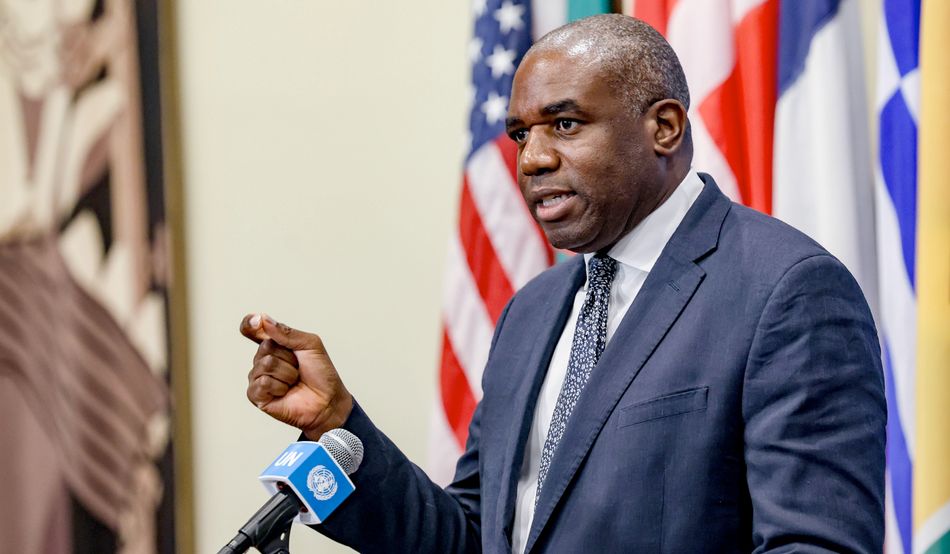I’ll take this diplomatic outcome any day: British government recognition of the State of Palestine at the UN General Assembly in September alongside France—the other European permanent member of the Security Council—as well as Commonwealth Canada, Australia (I hope) and several other EU states. This is a synchronised diplomatic domino effect, and a serious boost to efforts towards peaceful coexistence between Palestinians and Israelis, with equal rights and mutual security.
Recognition will add political impetus to the conclusions of the French-Saudi conference “for the peaceful settlement of the Question of Palestine and the implementation of the Two-State Solution”, which took place this week in New York. It charts a path to peace in the region. The vital ingredient is political will. Palestinians deserve freedom with justice. Israel does not need to live by the sword. That does not bring safety. There is a better way.
As an advocate of unconditional British recognition, the Britain Palestine Project, of which I am a trustee, welcomes the announcement, which is subject to a final government assessment. First, let me explain the term “unconditional”, then I will discuss the conditions for recognition set by Keir Starmer’s government.
More than 140 of the 193 UN member states have recognised Palestine unconditionally. They did so neither to punish Israel, nor to reward terror. They acted to uphold the right of the Palestinian people to determine their own future in their own state—Gaza, East Jerusalem and the rest of the West Bank. These are territories that are unlawfully occupied by Israel, as the International Court of Justice (ICJ) advised last year (it also called on all UN member states to work to end the occupation as soon as possible).
British recognition will not just be another number. We British have “form” in what is now Israel and Palestine, from before the Balfour Declaration (Israel’s birth certificate) in 1917 and through the British Mandate period in post-Ottoman Palestine, when our government blocked democratic development for as long as there was a Palestinian majority population. Britain ruled and misruled. It then cut and ran in 1948, when the forced displacement of 750,000 Palestinians was already well under way, leaving the UN to sort out the mess we made. I’d like to think that David Lammy had our historic irresponsibility in mind when he said at this week’s New York conference: “It is with the hand of history on our shoulders that HM Government intends to recognise the State of Palestine” at the UN General Assembly, subject to conditions.
British recognition of a Palestine alongside Israel will demonstrate equal esteem for both peoples, something lacking hitherto. It will also confound the public claim by Israel’s extremist government to all the land between the Mediterranean Sea and the Jordan River (last week, Israel’s Knesset voted symbolically to annex the West Bank). Recognition will uphold international law, something Labour promised it would do when it came to power. The attorney general, Richard Hermer, has said that a commitment to international law “goes absolutely to the heart” of this government and its approach to foreign policy. If so, it will be good when No 10 at last authorises the Foreign Office to publish its assessment of the policy implications of last year’s ICJ Advisory Opinion. I used to be a civil servant; I know that my ex-colleagues did their part and submitted to ministers many moons ago. Failure to recognise Palestine only serves to prolong the occupation.
Some contend, wrongly, that Britain should not recognise Palestine because it does not meet the criteria for statehood in the 1933 Montevideo Convention. That includes: a permanent population, a defined territory, government and the capacity to enter into relations with other states. They act as if legal advisers in the Vatican (no less) and over 140 states, most recently Norway, Spain, Ireland and Slovenia, had not checked before recognising Palestine. In 2011, then foreign secretary William Hague told parliament that Palestine “largely fulfils criteria for UN membership, including statehood”.
The population of Palestine is that of the West Bank (including East Jerusalem) and Gaza. Its defined territory is what our government calls the Occupied Palestinian Territories—the land which the ICJ advised is unlawfully occupied by Israel. The government is the Palestine Liberation Organisation and its executive, the Palestinian Authority (PA), with which our government signed a Memorandum of Understanding (MoU) in March. The foreign office regards the PA as the legitimate authority in Gaza and the West Bank. Palestine maintains relations with other states and is an observer state at the UN. Palestinian government is constrained by the unlawful occupation, but that cannot prevent recognition. Otherwise, by maintaining the occupation, Israel would wield a veto over a sovereign British government decision. Starmer has rightly rejected any veto.
And so to Starmer’s conditions. All relate to Israel, which must end the appalling situation in Gaza, allowing the UN to restart aid supplies; agree to a ceasefire; commit to a long-term, sustainable peace, reviving the prospect of a two-state solution; and not annex the West Bank.
These strong, justified demands are urgent and valid. They also have two other things in common: Benjamin Netanyahu has already rejected them all, and they really have nothing to do with the UK’s recognition of Palestine. Nor does Hamas. Britain recognises states, not governments, still less criminal factions such as Hamas. Our government rightly seeks to end Israel’s starvation and ethnic cleansing of Gaza, and its forced displacement of thousands of Palestinians in the West Bank, aiding and abetting murderous settler violence. To achieve those aims, the government needs to warn of significant adverse consequences—political and economic—if Israel persists. This is best done with partners. Britain is well placed to gather them, with strong relations in the Arab world and improved ties with Europe—and particularly a close working relationship with Emmanuel Macron. There can be an Israel-Palestine coalition of the willing. The imponderable is Donald Trump, who can make a positive difference, if he chooses.
With his conditions, Starmer framed recognition of Palestine as punishment for Israel, but it is anything but. It shows the way to a better future for both peoples: one of equal rights and security, with international guarantees. President Mahmoud Abbas of Palestine promises demilitarisation, mutual security and the prospect of elections.
Is this a chimera? Only if Benjamin Netanyahu pursues Israel’s current criminal and inhumane course of action—taking Israel into the abyss, as the former prime minister, Ehud Barak, has said. Israel’s international standing has disintegrated because of its total destruction of Gaza, calculated starvation policy and plans for forced migration in Gaza and in the West Bank, where illegal settlers kill with impunity and the economy hangs by a thread.
Hence the understandable urgency behind Starmer’s statement, in which he linked two issues which do not belong together. The Palestinian right to self-determination and statehood is unconditional, and Britain will recognise Palestine with France, Canada and others in September. The desperate need now is to end the famine in Gaza. Trump and determined European action can stop it; recognition of Palestine alone cannot. No one ever claimed that it could. But UK recognition is the right thing to do. It points the way to a future based on equality and mutual respect. If Israel listens to its friends, if it heeds the message from the New York conference, perhaps it can save itself from itself. The alternative will be very bad for us all.












